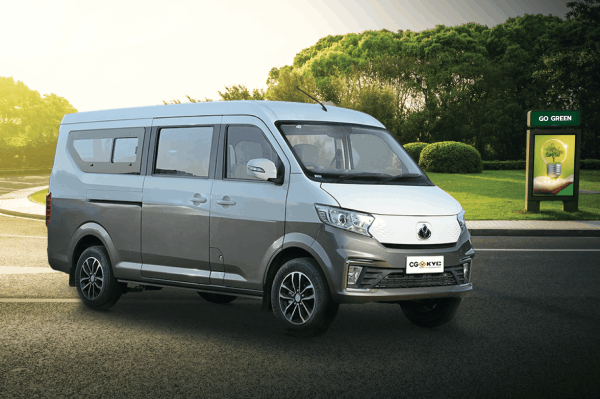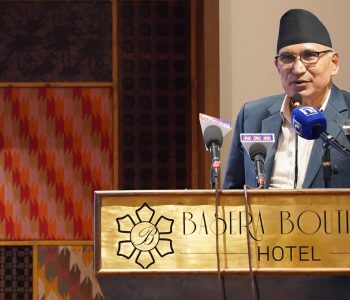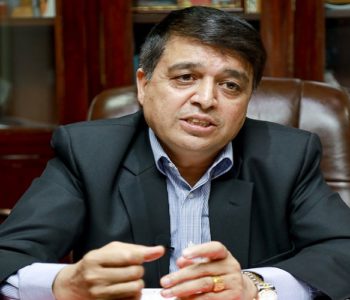Chaudhary Group selling vehicles of nonexistent KYC company

KATHMANDU: Chaudhary Group, a major player in Nepal’s business sector, has come under scrutiny for selling electric vans under the KYC name, a company that does not exist in any official capacity.
These electric vans, manufactured in China, lack any recognized parent company, raising concerns about their legitimacy and the protections available to consumers.
The KYC electric vans are assembled by local vendors in China and have been marketed in Nepal under the CG KYC brand. Despite the brand’s significant presence in the Nepali market, with over 700 units sold, KYC does not have an official showroom. Instead, CG Motors has placed a small board at the King Long Motors showroom in Panipokhari, Kathmandu, to advertise these vehicles.
The situation has raised numerous questions about the sustainability and reliability of these electric vehicles (EVs). Made from parts sourced from the local Chinese market, the longevity of the KYC vans and the availability of service warranties are ambiguous. This has led to concerns that consumers are being misled and potentially defrauded. No Chinese company has stepped forward to claim ownership or responsibility for the KYC brand, adding to the confusion.
Without a parent company, Chaudhary Group has not established an official showroom or service center in Nepal for these EVs. This lack of infrastructure means there is no clear pathway for addressing potential issues that arise post-sale. It remains uncertain who will take responsibility for the KYC brand’s status and any future complications.
This uncertainty extends to whether the local Chinese vendors or CG Motors will handle after-sales services and bear the liability for any damages. The absence of clarity has left consumers in a precarious position, unsure of where to turn for support.
According to stakeholders in the Nepali automobile sector, CG Motors’ inexperience in commercial EV sales and its distribution of KYC EVs, a brand without global recognition, have pushed the EV market into the gray area. “As non-existent company vehicles are openly sold, the silence of Nepal’s regulators and stakeholders suggests a lot of irregularities. If no one speaks up immediately, Nepal will become a dumping ground for low-quality, substandard EVs sold in the gray market,” said a member of the NADA Automobiles Association.
This sentiment is echoed by consumers who have already purchased the KYC vans. A customer using an EV van on the BP Highway shared his experience with Fiscal Nepal: “I bought the KYC EV, but there is no mention about to get spare parts or service after the sale. I am doubtful about the security of my investment in the future,” he said, adding that, there is not any specific service center.
The customer, who purchased a KYC EV six months ago, expressed concerns about the vehicle’s durability: “It’s been six months since I bought an expensive KYC EV, but I don’t know how durable it will be. Problems are already appearing in the battery, and I’m worried about what might happen in the future. I am very much concerned that my investment might be lost.”
The situation has highlighted significant gaps in consumer protection and regulatory oversight in Nepal’s rapidly evolving EV market. The lack of a parent company or official infrastructure for the KYC brand means that buyers are at risk of being left without recourse if their vehicles encounter issues.
Regulators and consumer protection agencies in Nepal are being urged to investigate the matter thoroughly and ensure that consumers are not left vulnerable. There is a pressing need for clear regulations and oversight to prevent the market from becoming flooded with low-quality, unsupported vehicles.
Chaudhary Group’s actions have not only put their reputation at risk but have also raised broader concerns about the standards and practices within the Nepali EV market. The lack of transparency and accountability in the sale of KYC electric vans calls for immediate attention from all stakeholders involved, including government bodies, industry associations, and consumer rights groups.
Hemanta Agrawal, CEO of CG Motors, has claimed that the KYC EV van is being jointly manufactured by the Changan Group and Kuayue Group. However, there is no mention of the KYC EV van in the official communications or websites of these companies. “Our EV is not of inferior quality, and we will take full responsibility for it. Sometimes, problems may arise in any product, and if there is a defect, we will take the necessary actions.”
“The sale of KYC electric vans by Chaudhary Group under questionable circumstances underscores the urgent need for stringent regulations and consumer protections in Nepal’s growing EV market. Without these measures, the potential for consumer exploitation and market instability remains high,” the NADA official said.













Facebook Comment